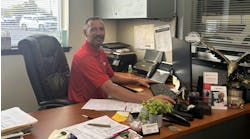WHOLESALE: Repair issues top list
While it seems that industry efforts to get issues heard in Washington are working, most jobbers realize it's not a good idea to rest on your laurels. For example, Steve Wiggins, president of both Wiggins Auto Parts/NAPA in Panama City, Fla., and the Florida Automotive Industry Association (FAIA), notes that his association is bringing the national Right to Repair (R2R) issue down to the state level. R2R, which was introduced last year but failed to make headway before the new Congress convened and at press time awaited reintroduction, mandates that automakers share repair and diagnostic information with independent repair shops.
"We're using the language of bills passed in two other states as a model," Wiggins explains. "We hope to have a bill written this year and get it through next fall, or maybe even spring."
Craig Bond, vice president of purchasing for Bond Auto Parts in Barre, Vt., brings up an analogy commonly used to explain the concept of R2R: "It's like having a furnace in Vermont that was made in California. Would you have to send it to California for service? Of course not. This country was founded on the ability of choices."
Like many auto parts suppliers, Bond says he believes the "handshake deal" automakers offer on getting codes to independents is simply not enough. But he also notes that many stores are in the unique position of selling to dealerships, while losing sales from consumer-attractive dealership warranties from both a retail and independent-technician perspective.
"A GM dealer, for example, will stock what they need to from an ACDelco dealer, which we are not, but of course they work on other vehicles besides GM," Bond explains, adding that he senses no animosity from dealers who know the aftermarket industry is rooting for R2R. "They understand where we're coming from."
Wiggins notes that associations are an important way of showing the industry's united front when dealing with legislative issues. FAIA recently had its annual Capitol Day event in Tallahassee. The March gathering was timed to coincide with a quarterly board meeting to ensure board and association members were able to meet with state legislators.
"It's good to keep our faces in front of the lawmakers," Wiggins says. "Even when there's not a big issue, we still go to keep our presence. That way, they know who we are when something does occur."
Bond agrees. He went to Washington, D.C., last year for the Automotive Aftermarket Industry Association's (AAIA) Legislative Summit, noting that he was impressed by the experience. "We visited our two senators and our congressman, and our position on R2R was well received," he says, noting that since then, only Sen. Patrick Leahy is in the same role after the November elections. Sen. Jim Jeffords retired and Rep. Bernie Sanders is now a senator.
While other responsibilities will prevent him from attending this year's legislative event, Bond says he learned a lot from last year's meeting. "It was so worth having gone down and seeing how the process works," he says. "Trying to get things done is so difficult with the bureaucracy and the lobbyists. It's an uphill battle."
Luckily, Bond notes, there are still things jobbers can do if they are not able to attend the Legislative Summit, which this year takes place June 12-13.
"I encourage everyone to visit the AAIA Web site (www.aftermarket.org) and try out one of the form letters that you can customize," he says.
RETAIL: Presenting a united front
Carl Davidson, service manager of The Wagon Shop Foreign Car Repair & Parts in Bellevue, Wash., notes that the debate over proposed Right to Repair (R2R) legislation doesn't seem to affect his niche market of European and Asian cars as much as domestic repair shops and parts stores. And in fact, the market for foreign parts has actually improved.
"It's a lot better pricing than it used to be," he says, noting that he personally finds the dealers' service contracts tough to argue with. "I own a Kia, and it has a 100,000-mile warranty. I just take it to the dealer for everything because it's all covered."
Davidson says dealer warranties haven't really impacted his business, however, because his niche customer often has older cars.
Pat Reis, owner of Reis Auto Parts & Service in Odebolt, Iowa, has an obvious vested interest in the passage of R2R. Although he has a repair shop himself, he supplies dealers and other repair shops in the area. He notes that the CARQUEST Auto Parts group, of which he is a member, is financially supporting the issue.
"Some necessary things do need to happen," he predicts. "Without (R2R or similar legislation), there is just too much control in the (OEMs') hands. Plus, a lot of manufacturers can't handle the repair demands out there."
Reis is no stranger to legislation, having served on the Odebolt City Council several years ago. He also served on the local school board when his children were in school. He notes that not only did those terms help raise his business profile in the community, it helped him better understand the regulatory process.
Looking at the 'Super 7' debate
Mike Woods, president of NAPA Auto Parts Plus in Wilton, Conn., notes that his location is squarely in the middle of a longstanding local debate: The so-called "Super 7" highway project, which would connect Norwalk and Danbury through a bypass in Wilton and has been trying to get off the ground for literally five decades. Both sides are equally passionate about why it should or should not be built.
Woods notes that while a proposed compromised project, the expansion of Route 7 from two to four lanes, might make it more difficult for customers to turn into his store's parking lot, it could also bring in more business by being more heavily traveled.
"The problem now is, Super 7 should have been done 20 years ago. Since that time, all the funds have been reallocated," he laments.
As for other issues, Woods points to rocketing health care coverage costs. He offers insurance through the Connecticut Business & Industry Association (CBIA), which he stresses "does a nice job, but there's no reason why we can't be in a bigger group. I'd like to be able to offer affordable health care for employees without smacking them in their paycheck every week," he adds.
A government specialist's perspective
Jason Tolleson, government and public affairs manager for the Specialty Equipment Market Association (SEMA), is also executive director of the SEMA Action Network (SAN), a national partnership of car clubs, enthusiasts and industry members who work together on legislative issues.
Tolleson points to SAN's budding State Automotive Enthusiasts Caucus, legislators who are active car enthusiasts, as helping promote positive relationships between lawmakers and the industry. In fact, three caucus members — Rep. Gabrielle Giffords, D-Ariz.; Rep. Harry Mitchell, D-Ariz.; and Sen. Jon Tester, D-Mont. — moved from the state to the federal level after the November election.
Tolleson also notes that SAN has many model legislative bills in circulation to help with pertinent issues.
"We've been taking this approach for several years — basically, we identify a bill sponsor and work with the person to get it through the Legislature," he explains. "Each state is slightly different, however. It could be as drawn out as a multi-year process or as easy as just a couple of phone calls." For example:
1. The street rod custom vehicle bill. Street rod and kit car enthusiasts can obtain specific titles for their vehicles, so "it's no longer a 2,000-pound paperweight," Tolleson jokes. On a more serious note, the bill makes it easier to get such vehicles on the road, which translates to additional potential aftermarket sales. As of press time, variations of the bill have been enacted in a number of states.
2. Tires efficiency standards. Tolleson says SAN is concerned that state legislation currently in review in Connecticut, Maryland and New York would go over and above an established federal standard.
3. Spinner hubcaps/brush and grille guard bans. In 2006, SAN was able to defeat bills in Iowa, New York and Virginia by proving there was no safety hazard posed to consumers. The issue has sprung up again in 2007, and Tolleson says the group will campaign against it.
In the meantime, www.semasan.com offers concise information on current legislative "hot topics" from around the county, as well as tips on how to contact legislators.



